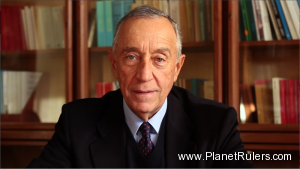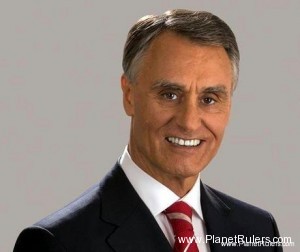Marcelo Rebelo de Sousa, President of Portugal (elected on Jan 24, 2016; re-elected on Jan 24, 2021 with 60.7% of the vote. Turnout is 39.5%.)
 Born in Lisbon, he is the eldest son of Baltasar Rebelo de Sousa and wife Maria das Neves Fernandes Duarte. He is named after Marcelo Caetano, who was to be his godfather. Previously he was a government minister and Member of Parliament, a law professor, journalist, political analyst and pundit.
Born in Lisbon, he is the eldest son of Baltasar Rebelo de Sousa and wife Maria das Neves Fernandes Duarte. He is named after Marcelo Caetano, who was to be his godfather. Previously he was a government minister and Member of Parliament, a law professor, journalist, political analyst and pundit.
He married in Évora, São Bento do Mato, on 27 July 1972 and later divorced Ana Cristina da Gama Caeiro da Mota Veiga, born in Lisbon, Santos o Velho, on 4 June 1950, daughter of António da Mota Veiga and wife Maria Emília da Gama Caeiro and current widow without issue of Jorge Manuel Vassalo Sors Lagrifa (7 May 1948 – 2 February 2005), maternal grandson of Manuel António Vassalo e Silva, by whom he has two children.
Source: https://en.wikipedia.org/wiki/Marcelo_Rebelo_de_Sousa
Cavaco Silva Aníbal António, Former President of Portugal

(b. Poço Boliqueime, 15 July 1939) Portuguese; Finance Minister 1979 – 80, Prime Minister 1985 – 95 Before he entered politics in the 1980s Cavaco was a successful academic. He graduated in Finance at the Technical University of Lisbon in 1964 and received a Ph.D. at the University of York in England in December 1973. Between 1974 and 1979 he occupied several professorships in Portuguese universities, and was a full professor at the New University of Lisbon.
A member of the Social Democratic Party (Partido Social-Democrata — PSD) since its foundation in May 1974, he was a consultant on economic policy in the party’s research institute. In January 1980 he became Minister of Finance and Planning in the sixth constitutional government, under the leadership of Francisco Sá Carneiro, but left the post soon after the tragic death of Prime Minister Sá Carneiro in an aviation accident. As Finance Minister, he gave priority to reducing the budget deficit. In October 1980 he was elected member of parliament, and on the death of the party’s deputy Prime Minister Mota Pinto was elected party president in 1985. He led the party in the 1985 elections to victory and became Prime Minister of a PSD minority government one month later. He refused to sign any pact with the other parties in the Assembly of the Republic and in 1987 his government was brought down by a motion of censure. In the postponed election of 19 July 1987, Cavaco Silva won an absolute majority, which he repeated in October 1991. In February 1995, he stepped down after serving ten years as Prime Minister; he had played a significant role in Portugal’s transition to a stable democracy. After his failure to be chosen as the PSD official candidate for the presidency of the Republic he returned to academic life.

